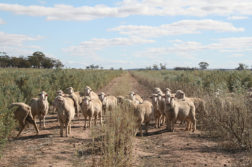Professor Ross Garnaut recently argued that those of us interested in sustainability must not make economic growth our enemy, but instead must focus on sustainable growth which reduces resource intensity:
“When we see economic growth in this light, we recognise that the important thing is to make sure that we put in place policies that encourage resource-conserving and discourage resource-using capital intensification and technological change”.
It’s an appealing argument. The theory is difficult to fault. If we recycle more raw materials, focus on services rather than goods and harness technological developments to improve resource productivity (producing the same or more with less raw materials) we can keep the economy growing while reducing our ecological footprint. However, if we move past the catchphrases and do some maths the enormity of the task becomes clear.
According to the Living Planet 2012 report, Australians use about 6.5 global hectares (gha) per person. A global hectare is one hectare of arable land with average productivity and is a way of combining many measures of resource use into a single figure. These measures include carbon dioxide emissions and a tally of the cropland, grazing land, forest, built up land and fishing grounds required to supply a population with their current consumption. While the world has a biocapacity of about 1.8 gha per person, Australia’s capacity is almost 15 gha per person.
Determining what a sustainable economy is rests on whether or not we look beyond our borders. Based on the above figures, we could say that we are already exceeding our footprint allocation by almost 400 per cent. Or we could conclude that we are at less than half our resource capacity. I use the Living Planet report only as an illustration here, others have used different measures to examine sustainable resource use and have come up with comparable results.
Of course, if we and all other countries with a global hectare surplus were to use it all for themselves it would leave substantially less than 1.8 gha per person for the rest of the globe. To me, the only ethically defensible position is to aim for the global average of available biocapacity and, through exports, share our excess with others. Making our economy sustainable by this measure, and maintaining economic growth as Professor Garnaut suggests, is a herculean task indeed.
If we assume a very successful long term GDP growth rate of 3 per cent, our GDP will quadruple over the next 50 years from about $1.4 trillion to just over $6 trillion. In order to play our part in creating a sustainable global economy we must cut our resource use down to 27 per cent of what it is now (1.8/6.5). So, taking account of economic growth, our resource intensity must be cut by about 94 per cent over the next 50 years in order to achieve sustainability. These back of the envelope calculations are rough (not least because the total number of available gha is decreasing over time and global population is rising) but good enough to illustrate the challenge.
On the other hand, if our economy didn’t grow, we would only have to cut resource intensity by about 73 per cent to be using up only our share of global resources Only 73 per cent!
Growth or no growth, if we take sustainability seriously – global sustainability that is, not parochial ideas about sustainability – then we have to quite radically change how we live and how we do business. There’s no indication that we’re even thinking about these issues, let alone ready to work on achieving sustainability.
In order to effectively curb greenhouse gas emissions and meet other sustainability goals, our governments need to be willing to make policy decisions which will not optimise economic growth and voters need to understand that this is desirable. Somehow the economists took over the halls of power and, being an economist myself, I know this is a serious problem.
Is anybody other than Ross Garnaut even talking about this stuff in the mainstream? Gillard or Swan? Abbott or Hockey? The Greens talk about these issues when they’re given the chance but even they have to temper the message to avoid being seen as too radical. A serious transition to a sustainable economy would take even more thought, planning and sacrifice than transforming to a low carbon economy.
I don’t believe economic growth per se is the problem; the problem comes from making growth the number one priority, above the environment and above social and individual wellbeing. Can we have a growing economy while we work towards sustainability? Yes. Can we have a sustainable economy which values the wellbeing of the citizens when growth is our primary goal? Almost certainly not.
While I agree with Professor Garnaut that we should not make economic growth our enemy, we should certainly re-evaluate the closeness of the relationship, not only for the sake of the environment but also for our overall happiness and wellbeing.
Donate To New Matilda
New Matilda is a small, independent media outlet. We survive through reader contributions, and never losing a lawsuit. If you got something from this article, giving something back helps us to continue speaking truth to power. Every little bit counts.



